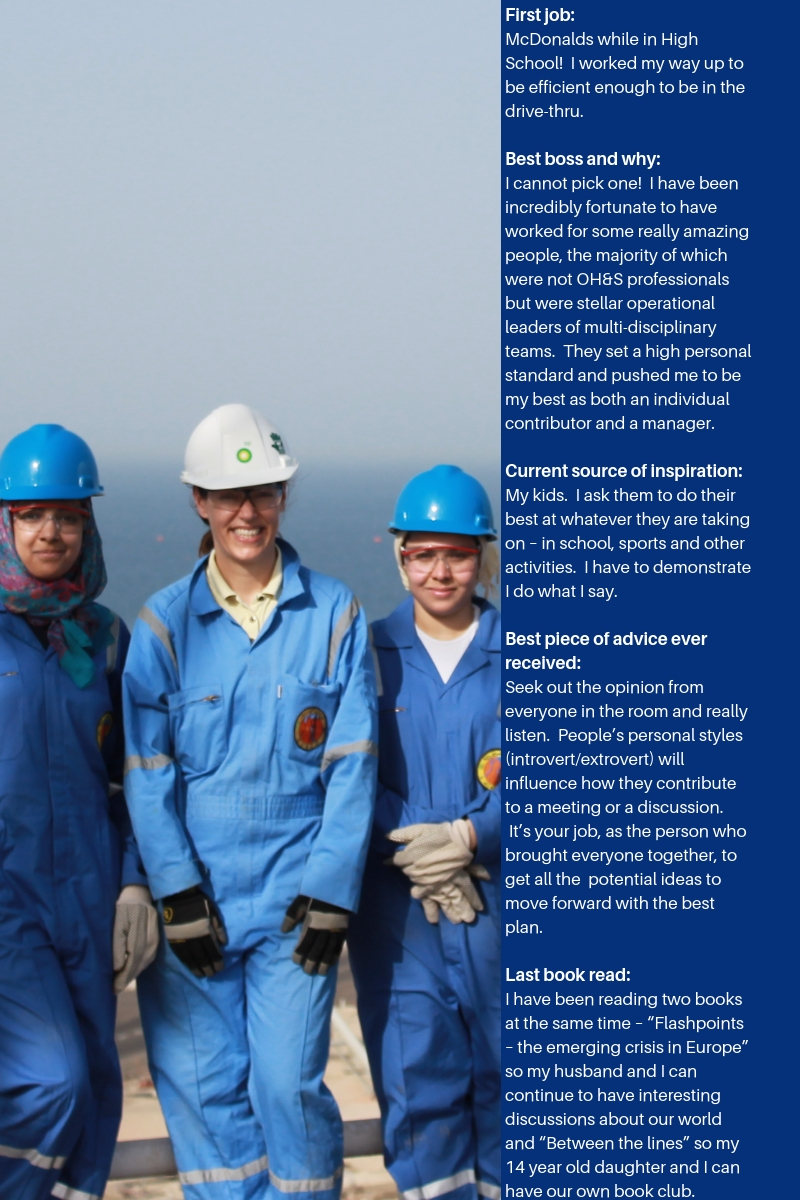When did you decide you wanted a career in occupational health and safety?
My undergrad and masters are both environmentally-focused, but as I started to work in the oil and gas industry, I learned that the really interesting jobs had both safety and environmental scope since hazards can often impact both domains.
What was your first occupational health and safety position?
Environmental Compliance Specialist for a small oilfield services company in Western Canada.
Tell us about your current job. What are your main areas of responsibility?
This fall, I started a new role with Health Emergency Management BC, supporting the Interior Health Region. After 23 years in oil and gas, I am really excited to learn about a new industry and focus my experience in crisis management and emergency response in a role that directly supports the local community.
What do you love about your job?
The best part of my day is working in partnership; enabling the business to move forward safely and in compliance. When people bring me a challenge, I want to make sure I live up to my reputation of helping solve problems so work can proceed. Because of the technical nature of many problems in oil and gas and the wide range of departments, I also get to learn something new all of the time.
What are the challenges you experience in your job?
Being able to impact how much time I spend on proactive versus reactive work. Obviously when an incident happens, the emergency response, follow up and investigation are the most important things. At times I have found that I have to manage my projects to make adequate time for those proactive things that will prevent an injury from happening in the first place.
What skills are important for success in the OHS field?
Deeply caring for the well-being of each person you work with, and challenging yourself to learn as much as you can about the jobs being done in your organization and the associated hazards and risk reduction. I also think that data management skills are extremely important to spot emerging issues before they become catastrophic or measure the impact a program change has in the workplace.
What tips do you have for new grads or those in entry level OHS positions who want to move up the ladder?
On the job training is complimentary and can be more important than what you can learn at a course. I have found junior people often focus on their development at formal training events, but the best way to learn more about the business and how you can contribute to its success is taking on special projects that are not directly in your core area. I often also ask and encourage others to ask the question, “what does good look like?” Often times there is an example of the deliverable you have been asked to complete and asking for this helps ensure alignment on scope and gives you a chance to focus your creativity on making something better versus starting from zero.
The OHS field has been evolving. What changes excite you most?
For me, working in an industry with flammable and explosive materials, the best change I have seen is how closely OHS works with Process Engineering/Process Safety and Integrity compared to the past. I think recognizing the unique skill sets in the 3 disciplines and working together both proactively and reactively will reduce the chance of fires and explosion that could impact workers, the public, and the environment.
What’s the future of the OHS profession?
I am hopeful the future is one that continues to contribute to a strong Canadian economy. OHS professionals, both inside a business or as the regulator, have a key responsibility to help maintain the safety of our industries. If front line workers can confidently perform their job safely, with the right training, tools and equipment, procedures and management oversight, the business has the best opportunity to be successful.
What do you do when you are not working?
I try to be outside with my family and we enjoy running, biking, skiing and snowboarding in the winter, and being on or near Lake Okanagan as much as possible in the summer.

